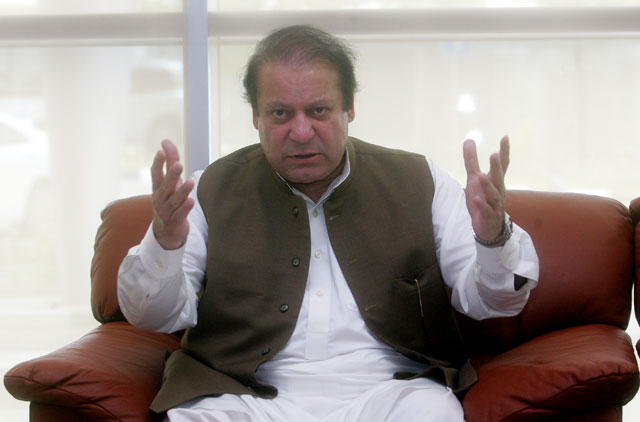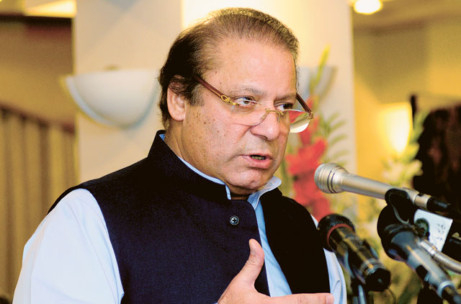Pakistan’s Prime Minister Nawaz Sharif’s latest tangle with the country’s influential army may have cooled off but just for the moment. In the past few weeks, tensions between the two sides soared in the wake of Sharif’s refusal to allow former army chief General Pervez Musharraf to leave Pakistan after the latter’s indictment on a charge of high treason.
The opportunity was indeed a blessing in disguise for Sharif though it was squandered by the prime minister. Musharraf’s ailing mother, who lives outside Pakistan, was indeed a good enough reason for the former general to travel abroad. In the wake of his departure, the Pakistani prime minister could have moved beyond the very basis of his apparently ongoing confrontation with the army.
Yet, the country’s ruling structure appears to be pressing for Musharraf’s prosecution on the grounds that this will finally put Pakistan’s once influential generals where they rightly belong — in the dock and accountable for their past deeds. While the intention may be worthwhile, the timing of seeking justice for historical grievances could not have been worse.
The historical reasons for a Sharif versus Musharraf tussle are obvious. The former was removed as prime minister by the latter in a bloodless coup in 1999 and subsequently sent into exile. But this is no time for revenge as Pakistan struggles to overcome the worst security challenge surrounding the country in its 67-year history. For anyone asked to choose between putting the Pakistan army in the dock for its past deeds and the need to confront the Taliban who pose a rising threat to the country, the choice is indeed obvious. No other institution in Pakistan aside from the army is capable of countering the threat.
On Friday, a conciliatory statement reported first by the Pakistani media, cited Khawaja Asif, the Defence Minister, stepping back from his past public criticism of the army. The move appeared to seek a fixing of the atmospherics in a country where Asif’s previous statements were widely noticed as a milestone in a journey by one of Sharif’s key ministers to confront the army. Now, the move to mend fences with the generals will hardly make a difference. The army’s apparent resistance to General Musharraf’s ongoing prosecution is in ample need of a quick resolution before the matter begins to settle down.
Route to conciliation
Meanwhile, in the past week, the decision by the Tehreek-e-Taliban Pakistan (TTP) — the main umbrella outfit of the Taliban — to unilaterally end a ceasefire could well proceed towards an impending escalation in bloodshed. The decision comes as Sharif continues to publicly believe in a negotiated settlement with the militant group. But this belief is misplaced.
The experience of other countries suggests that charged up militant groups often refuse to back away from a confrontational course, unless they are militarily weakened at first. Pakistan’s own recent experience easily highlights this point. The TTP’s acceptance of the ceasefire came only after its strongholds across the northern Khyber-Pakhtunkhwa province were targeted in repeated hits by the Pakistan Air Force and the army. If the TTP chose to enter a dialogue with the authorities only after its sanctuaries were hit militarily that demonstrates that the militants would be unwilling to permanently adopt the route to conciliation.
For Sharif, there are indeed other reasons to shed his historical baggage. Some of the world’s towering figures such as Nelson Mandela, the South African global icon, chose to shed their own baggage only to win widespread recognition for their choice. If indeed Mandela had remained a victim of his own history, he may have either failed to rid South Africa of its terrible legacy of apartheid or led his country through a period of intense bloodshed. His success in overcoming both — apartheid and bloodshed was indeed the very basis that made Mandela an iconic figure.
Sharif now has an opportunity to turn the corner for Pakistan and in the process carve out a place for himself on the map of history. Overcoming militancy will require the determination to oversee a concerted push to fight the militants in a way that has not been seen before. In the process, there will of course be some room for mending fences and forgiveness. Yet, these two equally vital traits will never be sufficient to lead Pakistan towards a new phase in its history. Curbing militancy on the other hand will indeed require a concerted push to confront the TTP in a way that its position is significantly weakened before it can be forced to negotiate.
In this journey, Sharif now requires the support of the generals more than ever before. But the prime minister’s recent clash with the army on Musharraf’s fate will just not help to build the kind of civil-military confidence, that is acutely necessary to fight and win the battle ahead.
Notwithstanding Sharif’s own history, there is a more compelling element of Pakistan’s history which is linked to the thousands of its citizens — civilians and military men, killed in just over a decade of brutal Taliban attacks. It is this history that must drive the government to tackle the challenge. Tragically however, Pakistan’s recent bloody history has become subservient to the prime minister’s own past as he appears to be seeking to settle scores.
Farhan Bokhari is a Pakistan-based commentator who writes on political and economic matters.












